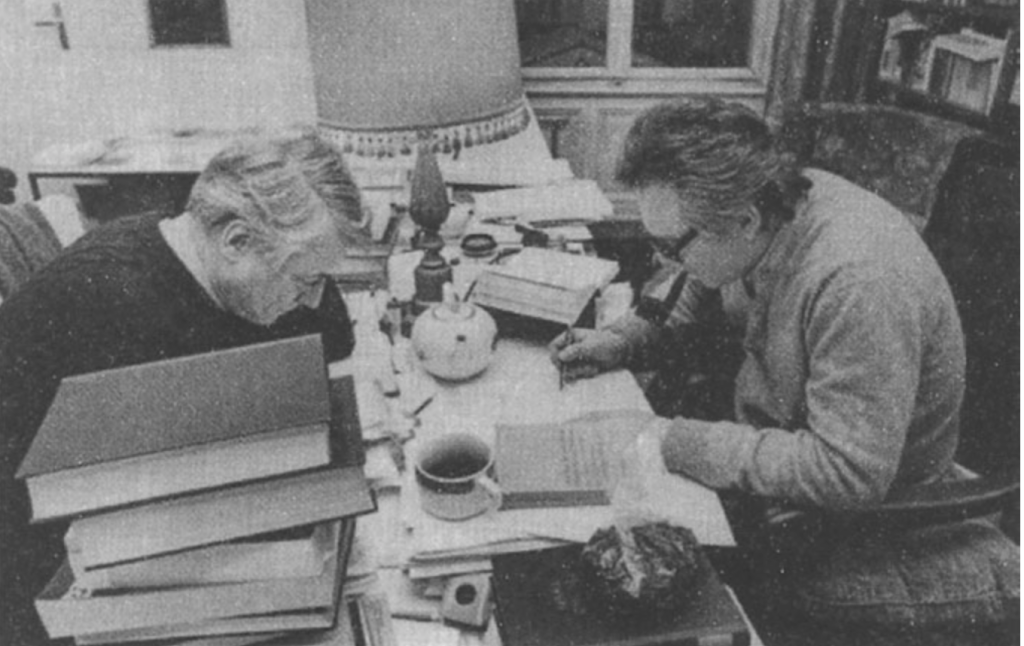In a blog that I deeply respect, Marginal Utility, Rob Horning writes of Theory Cults and particularly about how the “Cult of Lacan” functioned in his comparitive-literature seminars during graduate school. Horning dismisses Lacan as a religio-based prophet who was ultimately a narcissistic intellectual incapable of real emotional relations. As a result, he claims that Lacan over-compensated for his lack of any human relationships by creating a cult that required more and more jargon and complexity to ultimately understand.
Every one of Lacan’s intimates can attest to his narcissistic personality, but the problem with this argument is that Horning refers to Richard Webster to validate his disdain with the esoteric nature of theory, and Lacan in particular. Webster has made a living de-bunking Freud in a conservative and authoritarian manner, often based on specious, and frankly envious lines of thought. For example, Webster criticizes Lacan for attending Kojeve’s lectures on Hegel – implying that Kojeve was a charlatan who led the 20th century’s great thinkers down a path of utter obscurity.
What Webster is after at the end of the day seems to be positivistic science, and a full fledged support for ego psychology, and neuroscience, all devoid of theory. Forget all theoretical pretensions and interdisciplinarity. These are the signs of a fake, of a hack, of someone who is not original.
Well, please do me a favor: name one philosopher who did not pull from a number of the most ground breaking discoveries in science, biology, and other schools of philosophy during their own time? Webster criticizes Elizabeth Rudinesco, Lacan’s biographer, for not offering any criticism of his teachings and lionizing him to the same degree as his faithful students. Well, Webster should read the response that Orthodox Lacanians have to Rudinesco. His critique is useless because it is dismissive of psychoanalysis tout court, thus rendering the entire practice faulty.
To even bring his essay into conversation with Webster shows that Horning is not interested in any serious or nuanced critique of Lacan. I’d recommend reading thinkers such as Jean Laplanche and other so called “traitors” to the Lacanian school to understand Lacan’s shortcomings. For that matter, read Anti-Oedipus to fully appreciate the co-optation of psychoanalysis towards the authoritarian and repressive. Webster claims that Lacan’s entire system of thought is in response to his own emotional issues, and Horning relates this emotional disconnectedness to how he himself felt in comp-lit seminars during grad school.
Lacan was an alienated intellectual who hugely overvalues his own intellect and cognitive skills, and has become almost completely cut off from the world of ordinary human relationships” — serves as a pretty good description of what I remember of myself in graduate school. His judgment of Lacan’s theory, that it is “a fiction created by an intellectual in order to alleviate his own emotional predicament,” reminds me of my perpetually deferred dissertation. I could only experience higher education as a cult, because I approached it as an earnest devotee of the most irresistible cult of personality out there, the narcissistic cult of myself.

Despite Horning’s reliance on Webster’s work, which is filled with a wicked type of Nietzschean ressentiment, it reads to me like Horning’s reliance upon it is more a testament to how comp-lit departments attempt to bring in theory to their courses. I don’t think Horning ever took a philosophy course on Lacan. In my studies of Lacan, I have been fortunate enough to learn him from people who wish to isolate his theory and understand it in-and-of-itself. I have also been in art and comp-lit seminars that messily refer to ideas that aren’t given the time to be fully fleshed out in order to understand, so I definitely know how that feels.
But the truth of the matter, as I see it, is that the work of theory is valuable. There is an inherent value in working through a thinker and in spending great amount of time with a text, despite the feeling of drowning in a sea of jargon and complexity. How might we ever rise to the surface and begin to articulate an insight clearly if we haven’t given this time?
Horning’s blog does tap into much of the problems that many people of our generation have when it comes to theory more generally. This is a phenomenon that has even seeped into the structure of the postmodern novel. In n +1’s essay, The Theory Generation, we find an even more compelling description of the way that theory has functioned as a parasite for our generation’s ability to implement thought towards progressive social change, or to even put theory to productive use. Our failure to operationalize, and let alone, make theory even practical has in part been caused by something very natural: nostalgia. Why is it that 1970’s France becomes a sort of idyllic paradise of true social revolution? I would submit that there is a bona fide reason for this nostalgia, and that it is instructive, albeit sad.
The fetishization of May 68′ exists because we relate to it as something that is just a little too distant to our imaginary to fully understand, but just proximal enough to loosely apply to today’s times. The France of Lacan, Deleuze, and Derrida is a time in which new structures took to the streets, a time in which we are given a certain type of equipment that we have never been able to appropriate towards today’s struggles. What’s the problem with this precisely? The truth is that there is still much to learn from it, and lest we remain a-historic, we should understand France of the 60’s and 70’s, because as Alain Badiou claims, it was the last time something of a renaissance in the west took place.
Back to the novel, many protagonists are now often caught in a sort of tragic deadlock in being able to appropriate a relation to theory. I am reminded, in Horning’s argument, of the conflict that plagued the protagonist of The Corrections, an otherwise wonderful novel. The protagonist of the novel is a college professor at a small college in the midwest and he is totally tragic because – in part – how he relates to theory. Nicholas Dames writes of how theory has corrupted protagonists in postmodern novels:
It is as if the too-human frailty of these characters means that they fall short of the demands of Theory — a cunningly ironic demonstration (of a kind familiar from the entire history of realist fiction) that these demands might fall short of human needs.
The protagonist in The Corrections prides himself as a Foucault expert, and publicly speaks of his love of Habermas, the thinker that Franzen puts forward as more clear, and more cogent, as full of more use-value. He has never read any Habermas and as Franzen points out, he doesn’t read him because he is too clear.
The protagonist much preferred remaining in the clouded world of Foucault’s esotericism. This was a safe world where no one could touch him. The argument goes that this position is emblematic of our generation’s relation to obscure theory. We create a safe world where no one can touch us. Franzen, like Horning, seems to prefer theory that is loaded with some positive use-value. The right kind of theory is that which gives the reader a straight path to analyzing social phenomena and that escapes jargon.
But isn’t this just as much a fetishization of theory? The desire to work with more difficult thinkers exists and is real for a very good reason. I don’t want to live in the Anglo-American pragmatist tradition, or Habermas’ liberal speech acts and Kantian-Rawlsian thought experiments. Yes, I do believe that this type of theory is a large part of what is wrong about the world and how we come to understand what society should be. If that isn’t a battle worth fighting for in theory, I don’t know what is. The structuralism and post-structuralism of French thought does not have to be superfluous and tragic. There is a simple and compelling reason why these schools of thought are clinged to by our generation: they are more interesting.
They are difficult and thus they are more rewarding. I would even posit that if someone finds great pleasure with the inside intricacies of a theory and lacks the ability to articulate that theory in language that cannot be understood by someone who has never read any of it, that is their problem, not the theories fault.
If theory is that which cripples the subject in the postmodern novel, ergo, in real life, should we simply abandon it for a world of pragmatic clarity? All forays into theory begin with facing an impossible chasm filled with nostalgia, frailty and irony. Isn’t this part of the desire that situates our generation?
I’d much prefer sticking with theory and finding a way to traverse these shortcomings instead of reacting to its inadequacies by denying theories own potential. It is our lack of ability to operationalize theory in any coherent manner that is to blame, not the various schools of thought to which we ascribe.
The battle that involves making theory more accessible and less enclosed into its own cave, is a battle worth remaining faithful to, and for that matter, I think there are countless examples of thinkers that have made accessible the more difficult work of Lacan, Deleuze, and Derrida. I know many of them in the flesh, in some cases, I am happy to call them my friends.



Leave a comment